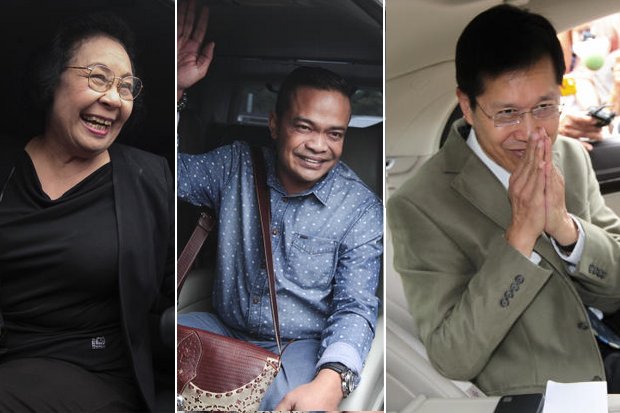
The Democrat and Pheu Thai parties have accepted a possible election delay to avoid the enforcement of the current version of draft charter.
They both claim the current version will only hamper national reconciliation.
On Thursday, the parties' representatives and key red-shirt United Front for Democracy against Dictatorship (UDD) co-leaders voiced in chorus their opposition to controversial issues in the draft charter and called for a constitution that is "fair, international and acceptable to the people".
Their comments were made during a meeting held Thursday with military officers of the Reconciliation Centre for Reform, a unit under the National Council for Peace and Order (NCPO).
The NCPO wants views from rival political parties, scholars and university students for use in its ongoing efforts to solve severe political division that has plagued Thailand since 2006.
It looks forward to the promulgation of a new constitution to pave the way for a new election expected next year.
- NRC opposes draft: Constitution 'favours political groups over parties'
Key politicians at the meeting preferred the postponement of the election to the enforcement of what they describe as a troubled draft charter.
It is better not to rush an election as it should be acceptable to have a delay, but it must be fair and held under a constitution approved by the people in a referendum, said Wirat Kalayasiri, head of the Democrat Party's legal team, quoting party leader Abhisit Vejjajiva.
What Mr Abhisit supports is "a good election", not just a move toward "a fast election", he said.
Pro-Thaksin UDD chairman Jatuporn Prompan said the poll could be put off for another two or three years.
Mr Jatuporn, who played a key role in leading a protest against the Abhisit government in 2009, echoed Mr Abhisit's proposal for a referendum on the new charter even though that would cost three billion baht, Mr Wirat added.
Among controversial issues in the draft charter, now being debated in the National Reform Council, is Section 182 that empowers a government to propose important bills during the Lower House session.
If the bill is later debated and the government wins the vote on the bill, it would be considered endorsed by the lawmakers.
However, many NRC members including Sombat Thamrongthanyawong, head of the NRC's political reform panel, argued this law could lead to serious disputes and problems in society if a future government proposes an amnesty bill.
Such chaos previously occurred when the Yingluck Shinawatra government supported its blanket amnesty bill for political offenders in late 2013, which led to massive protests by the Democrat Party and a large number of people led by anti-Thaksin People's Democratic Reform Committee.
If the charter draft goes ahead, what Mr Worachai sees will be "endless conflicts".
According to Mr Wirat, Mr Abhisit said if the NCPO and the Prayut Chan-o-cha government want to see their reconciliation efforts bear fruit, they need to carefully think how to have groups of people with different views to live together without violent quarrels.
The Democrat leader suggested national reconciliation will be achieved through both democratic and judicial means.
Democracy will be strong and foster if it is based on a good charter which will grant basic rights to people from all walks of life and ensure fairness.
As for the judicial process, it should be carefully followed especially when it is used to determine whether to grant amnesty.
Mr Wirat quoted Mr Abhisit as saying an amnesty process must be carried out under an atmosphere of reconciliation to be successful.
Gen Prayut, during his meeting with Indonesian President Joko Widodo at the Asian-African Leaders Summit in Indonesia Thursday, assured that a new election will not be held later than early on next year.
Meanwhile, the European Union Delegation to Thailand declined to comment on the matter.
A diplomat source said that a collective European view may be adopted when details of the meeting become available.


